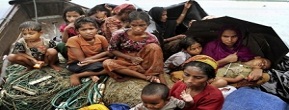No Citizenship Reform for Rohingya Muslims
 A government-appointed commission has rejected international calls for reforming a controversial citizenship law to accommodate the Rohingya Muslim minority in Burma.
A government-appointed commission has rejected international calls for reforming a controversial citizenship law to accommodate the Rohingya Muslim minority in Burma.
"International organizations are trying to criticize the 1982 citizenship law regarding the Bengalis," commission member Yin Yin Nwe told The Hindu on Monday, April 29.
Suu Kyi and the Rohingya: a Heroine No More
OIC Urges UN Action on Burma Muslims
Bengali-ethnic Muslims, known as Rohingya, have been denied citizenship rights since an amendment to the citizenship laws in 1982 and are treated as illegal immigrants in their own home.
The Burmese government as well as the Buddhist majority refuse to recognize the term "Rohingya", referring to them as "Bengalis".
Thousands of Rohingya Muslims have been displaced from their homes in western Burma last year after a deadly wave of sectarian violence with the Buddhist majority.
International outcry over the Burmese treatment of Rohingya Muslims has forced the government to form a commission to look into amending citizenship laws.
The commission has called for improving law enforcement protection of human rights in the Buddhist-majority country.
It has also called for banning "hate language" and "extremist teachings".
The commission, however, stopped short of calling for amending the citizenship law, which is seen as the heart of tension between Buddhists and Muslims in Burma.
No Rohingya
The commission has even declined to refer to Bengali-ethnic Muslims as Rohingya for fears of public backlash.
"It was not because of government pressure," commission member Kyaw Yin Hlaing said.
"Our intention is to bring about reconciliation and if we use Rohingya, we can't achieve that goal because of the high emotions of the people, not only in the Rakhine but also in the other parts of the country."
Described by the UN as one of the world's most persecuted minorities, Rohingya Muslims are facing a catalogue of discrimination in their homeland.
Rohingyas say they are deprived of free movement, education and employment in Burma.
They are not recognized as an ethnic minority by the Burmese authorities and say they suffer human rights abuses at the hands of government officials.
Human rights groups have accused Burmese police and troops of disproportionate use of force and arrests of Rohingya Muslims.
Human Rights Watch has accused Burmese security forces of targeting Rohingya Muslims with killing, rape and arrest following last year's unrest.
Many Rohingyas have sought refuge in neighboring Bangladesh, living in mud huts covered in plastic sheets and tree branches, which provide poor shelter during monsoon rains that cause mudslides and expose them to waterborne diseases.
Buddhist monks have been accused of fuelling hatred and hostility against Rohingya and Muslims of other ethnicities in Burma.
The commission has urged the government to ban "hate language" against any religion in Burma.
"The government needs to ban the use of hate language against any religion," the commission said.
"In particular, it needs to ban extremist teachings and activities."
Burma’s Muslims -- largely of Indian, Chinese and Bangladeshi descent -- account for an estimated four percent of the roughly 60 million population.
Muslims entered Burma en masse for the first time as indentured laborers from the Indian subcontinent during British colonial rule, which ended in 1948.
But despite their long history, they have never fully been integrated into the country.
Source: shafaqna
Add new comment